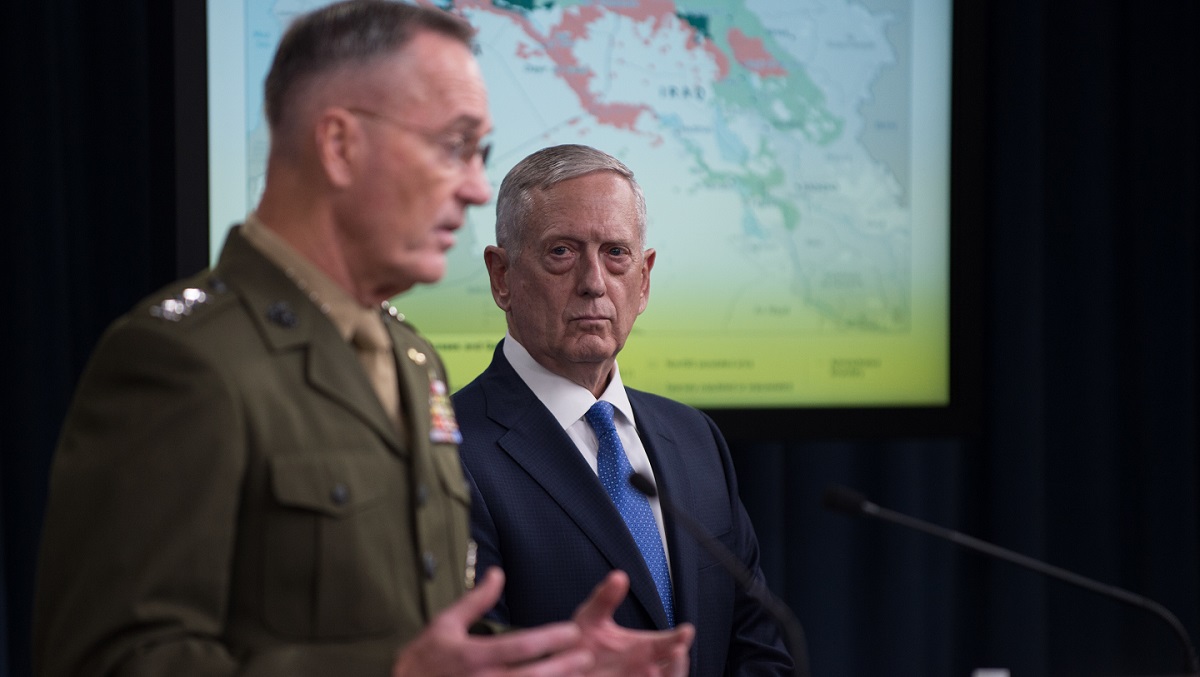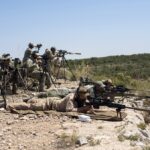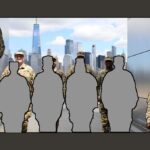
Civilian control of the military is a foundational concept of democracy in the United States. In recent years, voices in the community that study the civilian-military relationship have raised concerns that civilian control is being slowly eroded away by the outsized participation of the military in national policy making. Todd Schmidt, Director, Army University Press, joins guest host Carrie Lee to share his thoughts on how the nation got here and what might be done to better balance the relationship. This is the sixth episode in our multi-part special series supporting the U.S. Army War College’s Civil-Military Relations Center.
The information and data that informs policy, where is that information and data coming from? Is it coming from the Joint Staff? Is it coming from the intelligence community? I would argue that the agency that provides the information that informs policy, they’re having significant control over public policy.
Podcast: Download
Subscribe: Android | Email | RSS
Colonel Todd A. Schmidt, Ph.D., serves as Director, Army University Press at Fort Leavenworth, Kansas. He is the Editor-in-Chief of Military Review Journal; and Executive Producer of Army University Films. He serves as a non-resident fellow to the West Point/USMA, Simon Center for the Professional Military Ethic; non-resident fellow to the National Institute for Deterrence Studies; and an AUSA Leadership Fellow.
Carrie A. Lee is an associate professor at the U.S. Army War College, where she serves as the chair of the Department of National Security and Strategy and director of the USAWC Center on Civil-Military Relations. She received her Ph.D. in political science from Stanford University and a B.S. from MIT.
The views expressed in this presentation are those of the speakers and do not necessarily reflect those of the U.S. Army War College, U.S. Army, or Department of Defense.
Photo Description: Defense Secretary James Mattis and the Chairman of the Joint Chiefs of Staff, Marine Gen. Joseph F. Dunford, Jr., update the media on the defeat of the Islamic State of Iraq and Syria during a joint press conference at the Pentagon in Washington, D.C., May 19, 2017.
Photo Credit: DOD photo by Army Sgt. Amber I. Smith





Let us consider the thoughts here — and many other matters relating to the use of the “whole of government” assets of nations today as in the past — this, from the following perspective: (Herein to note that I [a] do not set today apart from certain similar times here, neither do I [b] set the U.S. apart from other nations here, nor do I [c] set the U.S. military apart from other militaries in my argument below.)
Thesis:
Given such “modernization-demanding” things as industrialization — and/or globalization in the past and/or today — and given the common and “universal” problems relating thereto;
Given these such matters, then, in times such as these, does not the purpose of a nation’s “whole of government” assets (which include a nation’s military assets) become (a) to achieve these such political, economic, social and/or value changes both at home and abroad and (b) to adequately deal with those who would, understandably, stand in the way of and resist these such necessary changes (i.e., those who depend — both at home and abroad — on political, economic, social and/or value status quos)?
Based on the above, might we consider that — in circumstances such as these — the opinions expressed, for example, by many/most senior military and civilian personnel (both active and retired and both yesterday and today), these such opinions would have little to do with “corporate” and/or “self” interest — and/or with political and/or partisan positions, interests, etc. — but, rather, would have everything to do these senior military and civilian personnel’s understanding of the obvious role of a nation’s “whole of government” assets; this,
a. In times when a nation’s national security will depend on “further modernization”/on achieving — both at home and abroad — political, economic, social and/or value change, and with:
b. Dealing adequately with those who — both at home and abroad — would stand hard against/would resist these such necessary changes?
(Example of such national security times:
“Proponents of this vision of a globalized economy characterize the United States as ‘a giant corporation locked in a fierce competitive struggle with other nations for economic survival,’ so that ‘the central task of the federal government’ is to ‘increase the international competitiveness of the American economy.” [See the end of the only full paragraph on Page 643 of the Catholic University of America, Columbus School of Law, paper “Moral Communities or a Market State … .”])
Thus, if “civilian control of the military is being slowly eroded away by the outsized participation of the military in national policy making,” then, in truth, this must be because the “civil” side of the house has —
a. Essentially “tasked” the military with national policy making; this,
a. By picking so many military and former military personnel for important “civil” positions?
(Question: Is this unique to today, or was this done in the earlier [industrial revolution; earlier globalization] times that I address in my initial comment above?)
COL Schmidt, in an article here on the War Room Blog three years ago (Jan 2021) seems to have called what is being discussed in the podcast above “Praetorian Propensities.” (That, in fact, is the title of that podcast.):
“A condition of praetorianism describes a dynamic in which military elites actively participate in civil government. They are political actors with political preferences, intervening in political process to corral unorthodox executives, preserve status quo, direct policy in accordance with their preferences, or a combination of these actions.”
As to COL Schmidt’s such suggestion, back in Jan 2021, I offered the following:
BEGIN QUOTE
Let us consider the questions here (and many other questions today relating to the use of U.S., and other, military, police and intelligence forces?) from the following — obviously controversial — perspective:
Thesis:
Given such things as globalization — and the “universal” problems relating thereto (often requires unwanted, but sometimes exceptionally necessary and significant, political, economic, social and/or value “change”) — given these such matters, then:
a. The purpose of the military, police and intelligence forces of the United States and other “developed” countries of the world today, this such purpose becomes, of necessity:
b. Much the same as the purpose of the military, police and intelligence forces of the “developing” countries of the world today, for example, as described here:
“a. An IDAD (Internal Defense and Development — I have added this this time for clarity) program integrates security force and civilian actions into a coherent, comprehensive effort. Security force actions provide a level of internal security that permits and supports growth through balanced development. This development requires change to meet the needs of vulnerable groups of people. This change may, in turn, promote unrest in the society. The strategy, therefore, includes measures to maintain conditions under which order development can take place.’ (See our Joint Publication 3-22, ‘Foreign Internal Defense,’ dated 17 August 2018, in Chapter II, “Internal Defense and Development” and Chapter 2, “Construct.”)
Based on this such thesis, might we consider that the opinions expressed by, for example, many/most of our senior military and civilian personnel (both active and retired and both yesterday and today); might we consider that these such opinions, generally speaking, have little to do with “corporate” or “self” interest — and/or with political or partisan positions, interests or concerns.
Rather, these such opinions, in many/most instances might we agree, are more likely to be related to:
a. Our senior military personnel’s understanding of the traditional “support growth through balanced development” (both at home and abroad) role/mission of the “whole of government” of the United States of America and, therein,
b. Their (our military personnel’s) traditional role in this such process?
From this such perspective, the question would seem to become — with regard to our article above —
a. Does this such activity constitute “praetorian propensities” or, indeed,
b. Something else/something entirely different?”
END QUOTE
As we look back over my thoughts above today, might we consider that — rather than acting along the lines of “praetorian propensities” (“intervening in political process to corral unorthodox executives, preserve status quo, direct policy in accordance with their preferences, or a combination of these actions”) our military personnel, today, simply have acted and opined as per their traditional roles in “change” times (which — as noted in JP 3-22 — routinely and normally leads to “unrest”); this such traditional military role being, to “provide a level of internal (and external?) security that permits and supports growth through balanced development.” (I.E., necessary political, economic, social and/or value change.)
May our resilience, hitherto the preamble of American values, superiority, and independent spirit avail undeterred; politically, and so forth to economic integrity, or civil permanence in just social endeavors. Laws are set in stone: in practice they are a dispensation for formidable stance. Whilst every law ever made to endure, how can any figure of political status berate if not in tandem to seek mutual concern? I can envisage how despicable that flies for granted the liberty and sacrifices we preserve our freedoms with purposes in our lives to reciprocate as a sole indispensable morale and values for light of the pursuit of happiness and American Standard.
To any avail, might we today hasten every voter have chin-straps on to go to the ballot boxes… or is it that we at testate to co-sign the indifference of collectivism emanating from sub-standard views in light of ill-hastening so that America’s compensated by some random individual’s opinion? Further in disarray by mixed ignorance for views that detract peril and change from disdainers who managed to enter office here or abroad? Or is it the utterances meant to virtue signal across public communication in all spheres of everyday living we might overlook, or stumble trying to extract a cohesive single thought from? It is evident that sometimes, being naive is truly a self-indulgence and excess leads to wisdom.
Basically, America is the Home of the free, the land of the brave. To misconstrue that misalignment to what the rule of law is meant to represent is incomparable to problems arising from self-entitlement that deprecate before an initiative and the stresses forced from a tangent: Failing in-concert with an objective to muster “growth through balanced development” merely is a strata. The deterioration of governance on the one hand, and characteristic in development to feigningly accept what leads to any avail is too a setting for perpetual chaos. It compels, it does not set order in the temporary onset of daily perspective. Therefore in appreciation and not substitution we limit the veracity of the matter and not foment substitution to the revolution entailing its change.
Yes, to ensure a firm ubiquity for our existence, and pathway to attenuate for discordant times abroad and limit its tolerance at home is in truth a Meritos due diligence, all considerations in venue of that in its place adapting to the course of its own change. Changes. Best, Mister-Antonio.